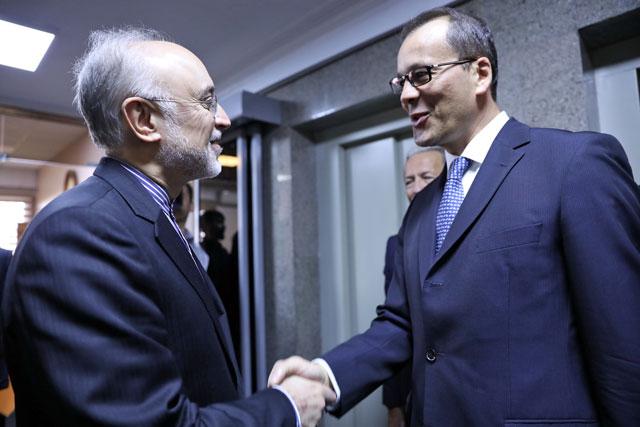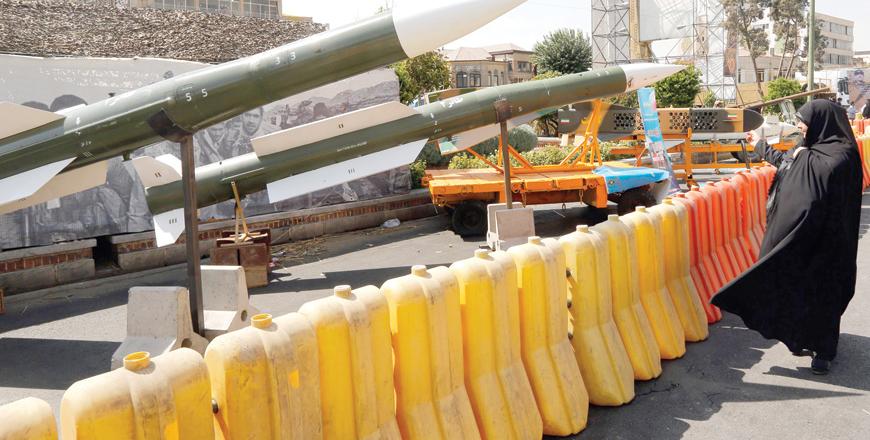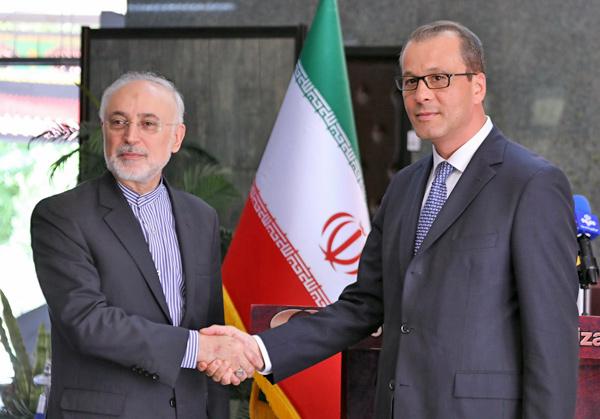You are here
Iran fires up advanced centrifuges in latest nuclear step
By AFP - Sep 07,2019 - Last updated at Sep 07,2019

In this file photo taken on February 25, 2009, Iranian technicians walk outside the building housing the reactor of Bushehr nuclear power plant at the Iranian port town of Bushehr, 1,200km south of the capital Tehran (AFP photo)
TEHRAN — Iran said Saturday it has fired up advanced centrifuges to boost its enriched uranium stockpiles, in the latest scaling back of commitments under a crumbling 2015 nuclear deal.
The Islamic republic was acting on a threat to further abandon its nuclear commitments based on a deadline it set for European powers to do something to shield it from US sanctions.
The country's Atomic Energy Organisation spokesman Behrouz Kamalvandi said it had activated 20 IR-4 and 20 IR-6 advanced centrifuges.
"The centrifuge machines, as they are engaged in research and development, will help with increasing the stockpile," he said.
"The capacity of these machines is many times more than the previous machines. This started as of yesterday [Friday]," he told a news conference in Tehran.
Under the 2015 Joint Comprehensive Plan of Action (JCPOA), Iran was allowed to enrich uranium using only first generation — or IR-1 — centrifuges.
Tensions have been escalating between Iran and the United States since May last year when President Donald Trump pulled out of the accord and began reimposing sanctions that have crippled its economy.
The arch-foes were on the cusp of confrontation in June when Iran downed a US drone and Trump ordered retaliatory strikes before cancelling them at the last minute.
Britain, France and Germany have repeatedly said they are committed to saving the deal that gave Iran relief from sanctions in exchange for curbs on its nuclear programme, but their efforts have so far borne little fruit.
Iran said on Saturday it was capable of enriching uranium beyond 20 per cent but for now it had no plans to do so.
"Our plan is that if the other parties act on their commitments, we too return to our commitments," said Kamalvandi.
US ‘not surprised’
US Defence Secretary Mark Esper said he was “not surprised that Iran has announced that it’s going to violate the JCPOA”.
Britain called Iran’s move “particularly disappointing at a time when we and our European and international partners are working hard to de-escalate tensions”.
Despite the decision to further step back from the 2015 deal, Kamalvandi said Iran would allow the International Atomic Energy Agency (IAEA) to continue monitoring its nuclear programme, as it has done under the 2015 accord.
“Regarding the monitoring and accesses of the IAEA... so that everything is clear [Iran’s] commitments regarding transparency will be followed as before,” the spokesman said.
The European Union on Friday emphasised its reliance on the IAEA to monitor Iran’s activities as it voiced “great concern” over the country’s decision to roll back its commitments.
In its latest report on August 30, the watchdog said it continues to verify compliance through cameras and on-site inspections.
But in an apparent hint at worries about access it said “ongoing interactions... require full and timely cooperation by Iran”.
On Saturday, the UN atomic agency noted Iran’s latest move and indicated its inspectors were ready to check its compliance.
“Agency inspectors are on the ground in Iran and they will report any relevant activities to IAEA headquarters in Vienna,” spokesman Fredrik Dahl said.
Europe ‘must hurry’
Iran’s new step came after Britain, France and Germany were unable to find a way to offset the impact of sanctions on the country before a September 7 deadline set by the Islamic republic.
“If Europe wants to do something, it must hurry, because returning to the situation before reducing commitments could take time,” Kamalvandi said.
Tehran has already hit back twice with countermeasures in response to the US withdrawal from the 2015 deal.
On July 1, Iran said it had increased its stockpile of enriched uranium to beyond the 300-kilogramme maximum set by the deal.
A week later, it announced it had exceeded a 3.67 per cent cap on the purity of its uranium stocks.
Saturday’s developments came on the eve of a visit to Iran by the acting head of the IAEA, Cornel Feruta.
Kamalvandi said Feruta would meet the head of Iran’s Atomic Energy Organisation, Ali Akbar Salehi, and Foreign Minister Mohammad Javad Zarif.
Related Articles
TEHRAN — Iran's atomic agency chief hit out on Sunday at European powers, saying their broken promises gave the Islamic republic little choi
VIENNA — Iran has committed a further breach of its nuclear deal with major powers by enriching uranium with advanced centrifuges, and plans
TEHRAN — The acting head of the UN atomic watchdog, Cornel Feruta, arrived in Tehran on Sunday for high-level talks with Iranian offici

















